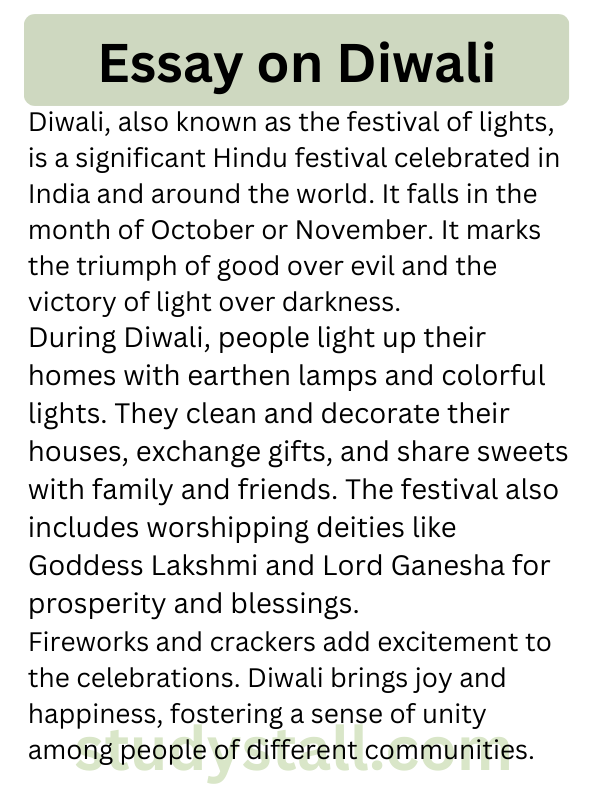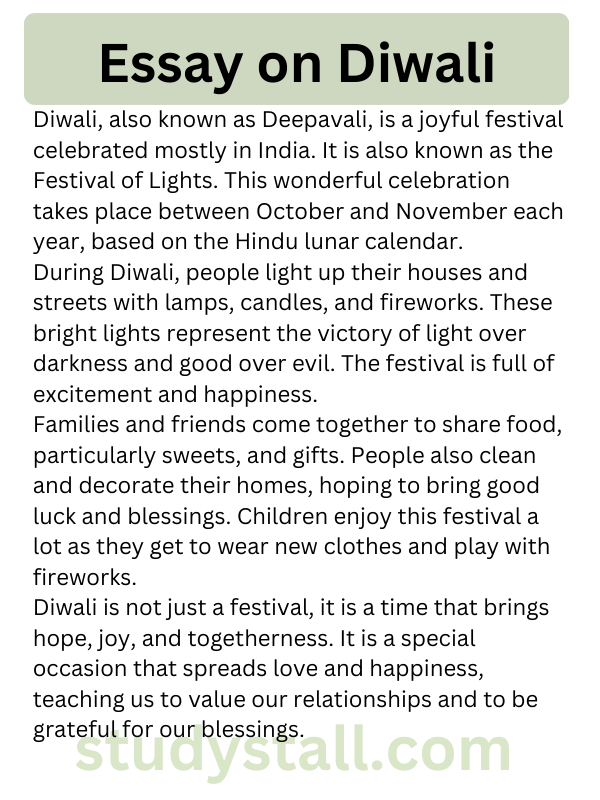Diwali, also known as Deepavali, is one of the most important and vibrant festivals celebrated in India and among Indian communities around the world. Diwali is also known as the Festival of Lights because of the tradition of lighting lamps, candles, and fireworks that brighten up the dark nights. This festival usually takes place between October and November, depending on the Hindu lunar calendar .
Diwali is not only a festival but also a symbol of hope, joy, and community spirit. It marks the victory of light over darkness, good over evil, and knowledge over ignorance. The festival brings families and friends together in a spirit of celebration and togetherness. It fills the hearts of people with joy and the streets with a multitude of colorful decorations, sweets, and the sounds of firecrackers. Diwali is a time to express happiness and gratitude, and it creates an atmosphere of warmth and love everywhere it is celebrated.
Essay on Diwali 100 Words
Diwali, also known as the festival of lights, is a significant Hindu festival celebrated in India and around the world. It falls in the month of October or November. It marks the triumph of good over evil and the victory of light over darkness.

During Diwali, people light up their homes with earthen lamps and colorful lights. They clean and decorate their houses, exchange gifts, and share sweets with family and friends. The festival also includes worshipping deities like Goddess Lakshmi and Lord Ganesha for prosperity and blessings.
Fireworks and crackers add excitement to the celebrations. Diwali brings joy and happiness, fostering a sense of unity among people of different communities.
Essay On Diwali 150 Words For Class 6
Diwali, also known as Deepavali, is a joyful festival celebrated mostly in India. It is also known as the Festival of Lights. This wonderful celebration takes place between October and November each year, based on the Hindu lunar calendar.

During Diwali, people light up their houses and streets with lamps, candles, and fireworks. These bright lights represent the victory of light over darkness and good over evil. The festival is full of excitement and happiness.
Families and friends come together to share food, particularly sweets, and gifts. People also clean and decorate their homes, hoping to bring good luck and blessings. Children enjoy this festival a lot as they get to wear new clothes and play with fireworks.
Diwali is not just a festival, it is a time that brings hope, joy, and togetherness. It is a special occasion that spreads love and happiness, teaching us to value our relationships and to be grateful for our blessings.
Diwali Essay in English 500 Words
Diwali, also known as Deepavali, is one of the most widely celebrated festivals in India. It holds immense significance in Hindu culture and is celebrated with great enthusiasm and joy. This festival usually falls in the months of October or November, depending on the Hindu lunar calendar. Diwali is a time of joy, lights, sweets, and the spirit of togetherness.
The significance of Diwali lies in its various mythological and historical stories. One of the most popular legends associated with Diwali is the return of Lord Rama, along with his wife Sita and brother Lakshmana, to their kingdom of Ayodhya after defeating the demon king Ravana. The people of Ayodhya welcomed their beloved prince by lighting oil lamps, which is why the festival is known as the “Festival of Lights.”
Preparations for Diwali begin weeks in advance. People clean and decorate their houses to welcome Goddess Lakshmi, the goddess of wealth and prosperity. Beautiful rangoli designs made of colored powders and flowers adorn the entrance of homes, adding to the festive charm. New clothes are bought, and people exchange gifts and sweets with friends and relatives.
On the day of Diwali, the celebrations start in the evening. Homes and streets are illuminated with earthen lamps, candles, and colorful electric lights, creating a mesmerizing sight. Bursting of firecrackers adds to the excitement, although nowadays, there is a growing awareness of the harmful effects of excessive fireworks on the environment and health.
One of the most important aspects of Diwali is the Lakshmi Puja. People worship Goddess Lakshmi and Lord Ganesha, seeking their blessings for prosperity, wealth, and wisdom. Families gather together for the puja, offering prayers, and performing rituals to invoke the blessings of the deities.
Another significant tradition during Diwali is the exchange of sweets and gifts. It symbolizes the spirit of giving and sharing happiness with others. Special Diwali sweets like ladoos, kaju katli, and jalebi are prepared and distributed among friends and family.
Apart from the religious and cultural aspects, Diwali also has social and economic significance. For businesses and shopkeepers, it marks the beginning of the new financial year. People purchase new items, especially gold and silver, as it is considered auspicious to do so during Diwali. The festival also boosts the economy through increased sales and consumer spending.
While Diwali is primarily a Hindu festival, it is celebrated by people of various faiths and communities in India. It promotes a sense of unity and harmony among people from different backgrounds, fostering the spirit of brotherhood.
In recent years, there has been a growing awareness about celebrating eco-friendly Diwali by avoiding excessive use of firecrackers. People are encouraged to use eco-friendly and biodegradable decorations to reduce environmental pollution and keep the festivities sustainable.
In conclusion, Diwali is a beautiful festival that brings joy, lights, and togetherness in the lives of people. It represents the victory of good over evil and the triumph of light over darkness. The spirit of Diwali lies in spreading happiness, sharing love, and embracing the diversity that enriches the cultural fabric of India. As we celebrate this auspicious occasion, let us remember the true essence of Diwali and strive to make it a festival of lights and joy for everyone around us.

